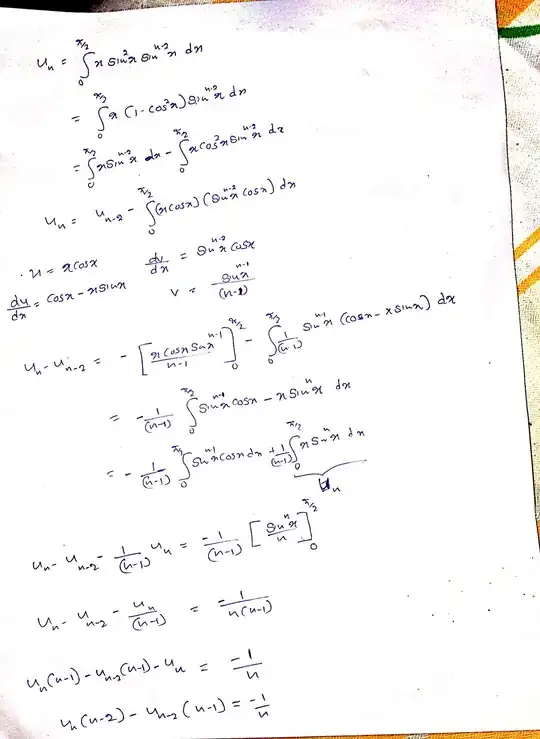Given,$$u_{n}=\int^{\frac{\pi}{2}}_{0} x \sin^{n}x\ dx=\int^{\frac{\pi}{2}}_{0} (x \cdot \sin x) \sin^{n-1}x\ dx$$
Using Integration by parts:
$$u_{n}=\left[\sin^{n-1}x(-x \cdot \cos x + \sin x)\right]^{\frac{\pi}{2}}_{0}-\int^{\frac{\pi}{2}}_{0} (-x \cdot \cos x + \sin x) (n-1)\sin^{n-2}x \cos x\ dx$$
$$\Rightarrow u_{n}=1+(n-1)\int^{\frac{\pi}{2}}_{0} (x \sin^{n-2}x\cdot \cos^{2}x - \sin^{n-1}x \cos x)\ dx$$
$$\Rightarrow u_{n}=1+(n-1)\int^{\frac{\pi}{2}}_{0} (x \sin^{n-2}x\cdot (1-\sin^{2}x)\ dx - (n-1)\int^{\frac{\pi}{2}}_{0}\sin^{n-1}x \cos x)\ dx$$
$$\Rightarrow u_{n}=1+(n-1)\int^{\frac{\pi}{2}}_{0} x \sin^{n-2}x\ dx- (n-1)\int^{\frac{\pi}{2}}_{0} x\sin^{n}x)\ dx - (n-1) \cdot \frac{1}{n}$$
$$\Rightarrow u_{n}=1+(n-1)u_{n-2}- (n-1)u_{n} - 1+ \frac{1}{n}$$
$$\Rightarrow n \cdot u_{n}=(n-1)u_{n-2}+ \frac{1}{n}$$
$$\Rightarrow \bbox[5px,border:2px solid red]
{u_{n}=\frac{n-1}{n}u_{n-2}+ \frac{1}{n^{2}}}$$
I think you can proceed from here.
 Now you can plug values of n into last part then you can get your answer.
Now you can plug values of n into last part then you can get your answer.